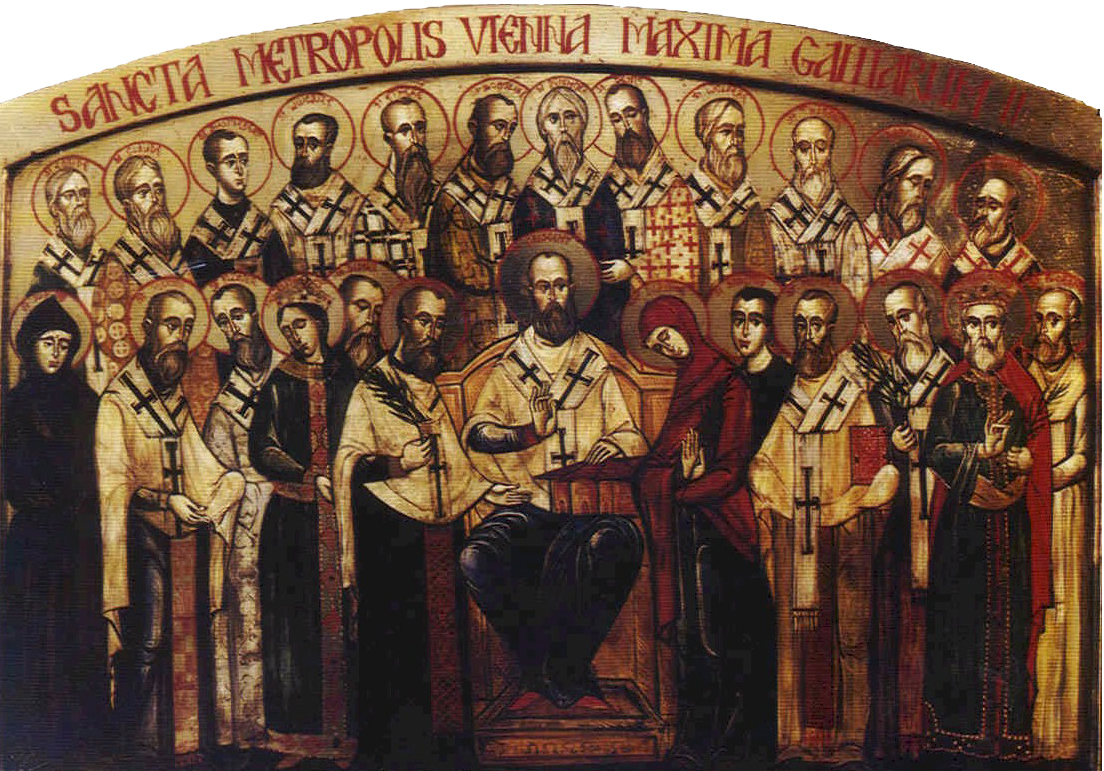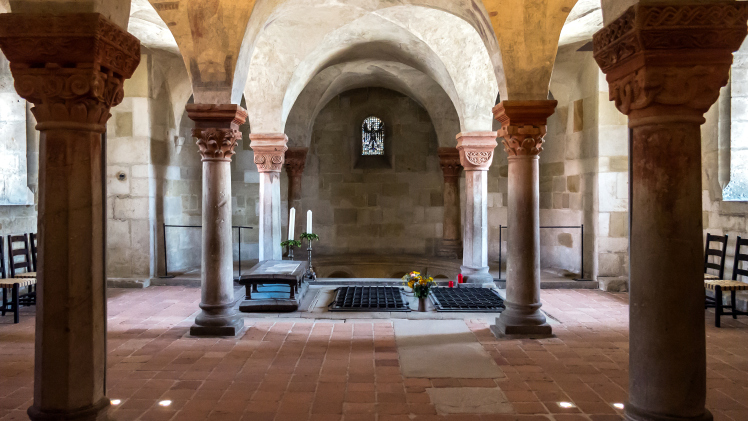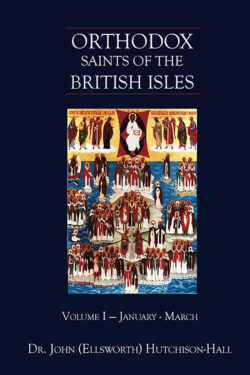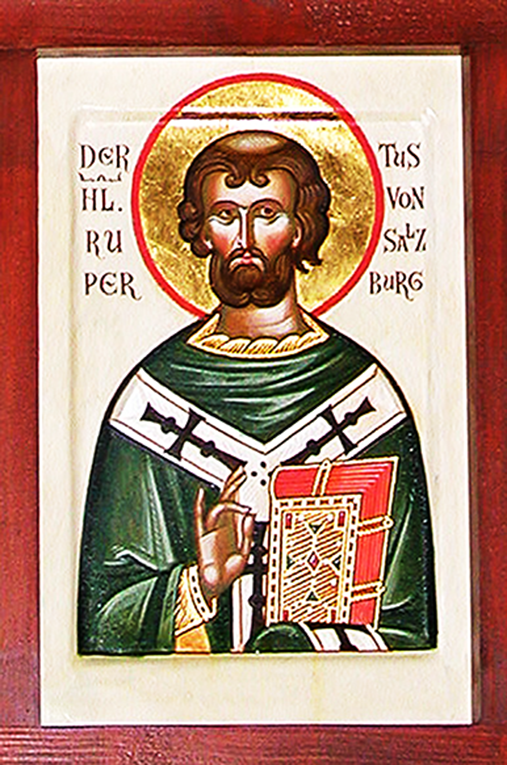
Orthodox Saints of the Pre-Schism
See of Rome
27th March (NS) — 14th March (OS) 2024
BONIFACE CURITAN, a Bishop of Ross in Scotland, who was highly likely the leader of a group of missionaries sent from Rome to evangelise the Picts and Scots. St. Boniface Curitan is said to have founded one hundred and fifty churches. He reposed circa 650.
DIACONUS, (Sixth Century), a deacon in the Marsi in present-day central Italy, whose name is lost to time, hence he is simply called "Diaconus (the Deacon)". He was martyred by the Lombards together with two monks.
LEO, (Fourth or Fifth Century), a bishop of whom nothing is now known to us. It seems he was martyred by Arians, in the Agro Verano, Rome.
MARTYRS of ROME, forty-seven martyrs who are traditionally believed to have been baptised by the Apostle Peter (29th June), and are said to have been martyred together in Rome, circa 67, during the reign of the Emperor Nero (r. 54–68).

Tomb of St. Matilda of Saxony in the crypt of the church of
St. Servatius, Quedlinburg, Saxony-Anhalt, Germany.
Image from Wikimedia Commons licensed
under Creative Commons Attribution.
MATILDA (MATHILDIS, MAUD) of SAXONY, the wife of Henry I the Fowler, King of East Francia (r. 919–936). A very generous and charitable woman, following the repose of her husband (who was twenty years her senior), St. Matilda devoted herself to using her inherited wealth and estates to establish churches and monasteries. Amongst these were Abbeys in Nordhausen, Pöhlde, Engern, and Quedlinburg, but to list a few. Their son Otto, who succeeded his father as King of Germany in 936, and then Holy Roman Emperor (r. 962–973), and/or (depending upon the source) Royal Advisors, accused St. Matilda of financial improprieties, namely embezzling funds from the Royal Treasury to fund her charitable activities. She was sent into exile for a time, then allowed back at Court. She seems to have spent the last of her years at Quedlinburg Abbey, where she reposed on 14th March, 968. She was buried next to her husband in the crypt of St. Servatius Church in Quedlinburg in present-day Saxony-Anhalt, Germany.
PETER and APHRODISIUS, (Fifth Century), martyrs under the Arian Vandals in North Africa.
MARTYRS of VALERIA, (Fifth Century), two monks in the province of Valeria in present-day Italy who were slain by the Lombards by being hanged on a tree. Even after they were dead, they were heard singing psalms even by their enemies.
TALMACH, little is known of this saint aside from a few cursory references to him by the Bollandists in the Acta Sanctorum, and by the noted hagiographer and historian, John Colgan O.F.M. (†c. 1657), as well as in an old Life of St. Barr of Cork (25th September). He seems to have been a disciple of St. Barr at Lough Erc (present–day Guagán Barra, Co. Cork, Ireland), and later founder of a now unknown monastery.
Get your copy of Orthodox Saints of the British Isles today.
Available at Amazon or your favourite e-bookstore.
ALKELD (ATHILDA), there are two churches in Yorkshire dedicated to this saint about whom nothing is known save for an ancient painting showing St. Alkeld being strangled by Danish pirates. This event may safely be dated to the tenth century.
AMATOR (AMADOR), (Date Unknown), several churches dedicated in Portugal are dedicated to this hermit of whom nothing is known.
AUGUSTA, (Fifth Century), the daughter of the pagan Teutonic Duke of Friuli, who upon learning of St. Augusta’s becoming a Christian, was so angered that he personally beheaded her.
PHILETUS, LYDIA, MACEDO, THEOPREPIUS (THEOPREPIDES), AMPHILOCHIUS, and CRONIDAS, St. Philetus, a senator, his wife St. Lydia, and their children SS. Macedo and Theoprepius, were martyred in Illyria circa 121. Martyred along with St. Philetus and his family were SS. Amphilochius and Cronidas both high ranking officials.
ROMULUS, an Abbot of St. Baudilius Abbey near Nimes. When the Sarasens invaded the area, St. Romulus and his community fled, settling in the ruins of a monastery in Saissy-les-Bois, which they proceeded to refurbish. St. Romulus reposed circa 730.
RUPERT (ROBERT) of SALZBURG, Apostle of Bavaria and Austria. St. Rupert was a French royal who was consecrated Bishop of Worms and commenced to evangelise the south of Germany. Beginning at Regensburg, St. Rupert worked his way south, settling in the ruins of Iuvavum which had been given to him by Theodo, Duke of Bavaria (†c. 716). There St. Rupert built a monastery for men and one for women where his sister (or niece) St. Ermentrude (30th June) served as first Abbess. These laid the foundation of what came to be Salzburg, Austria. St. Rupert established his See there, and was the first Bishop of Salzburg. St. Rupert reposed circa 717.
SUAIRLECH, an Abbot of Fore Abbey in Co. Westmeath, Ireland. He was known for his zeal, and later consecrated first Bishop of that See. St. Suairlech reposed circa 750.
Prior to the Schism the Patriarchate of Rome was Orthodox, and fully in communion with the Orthodox Church. As Saint John of Shanghai and San Francisco +1966 said “The West was Orthodox for a thousand years, and her venerable Liturgy is far older than any of her heresies”.
Details of British Saints excerpted from Orthodox Saints of the British Isles.
Details of continental saints from these sources.
In many cases there are several spelling versions of the names of saints from the British Isles. I use the Oxford Dictionary of National Biography version as the primary version with the more prevalent version in parenthesis e.g. Ceadda (Chad) of Lichfield.


